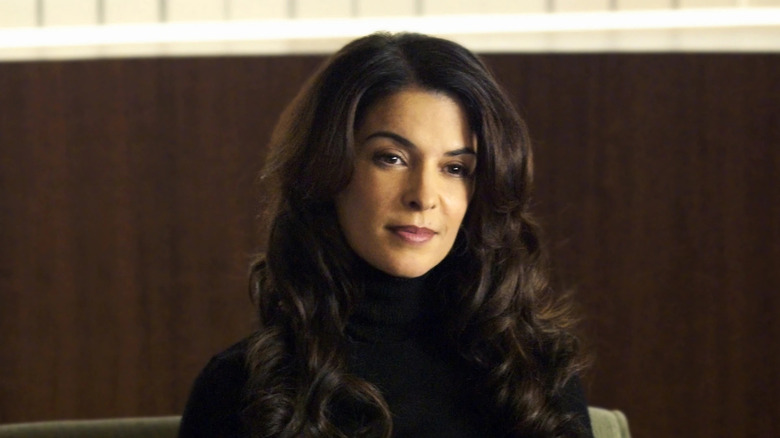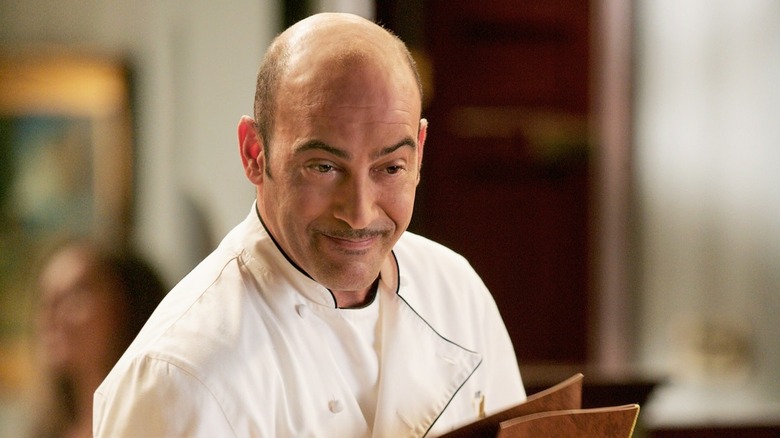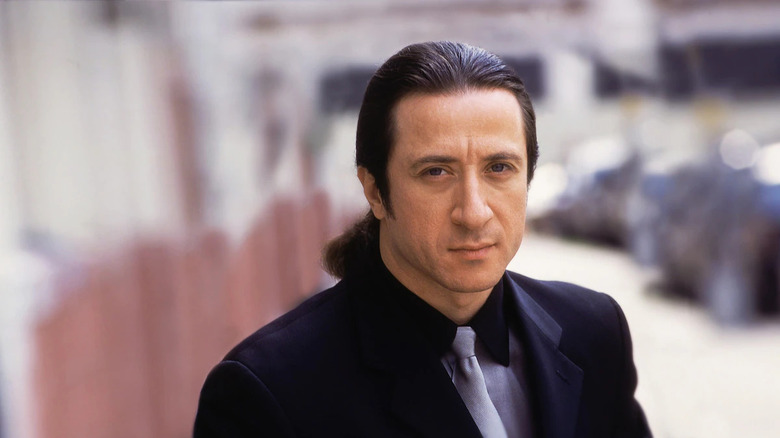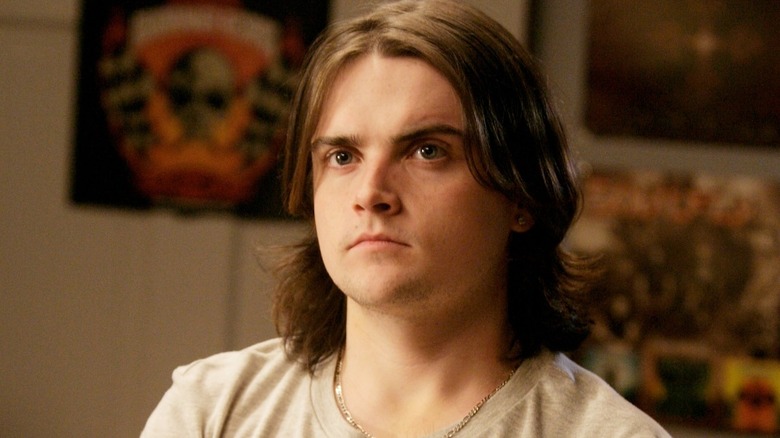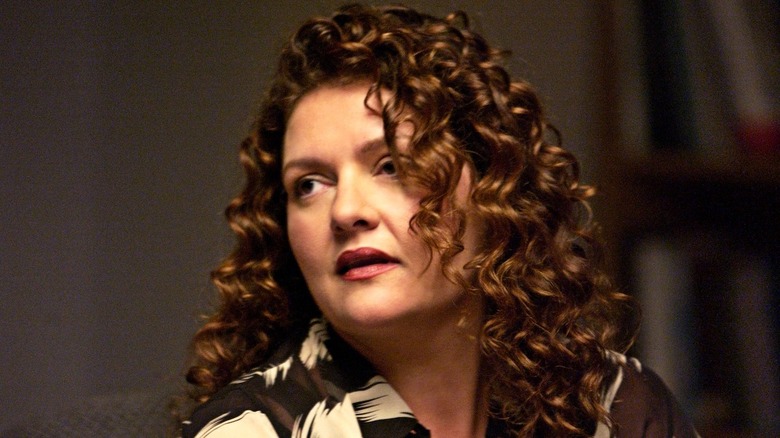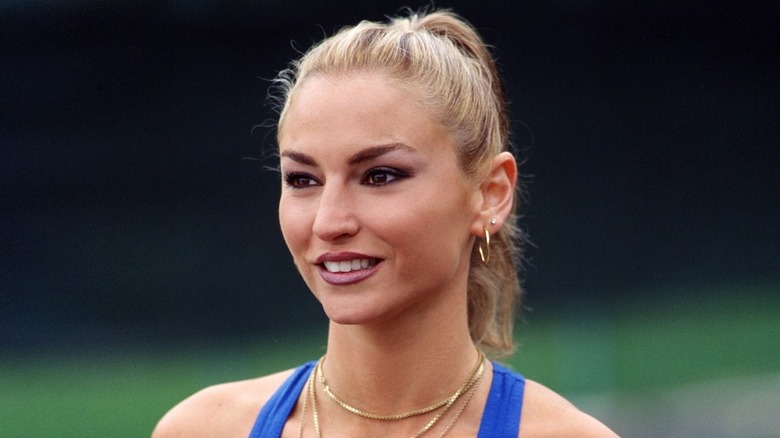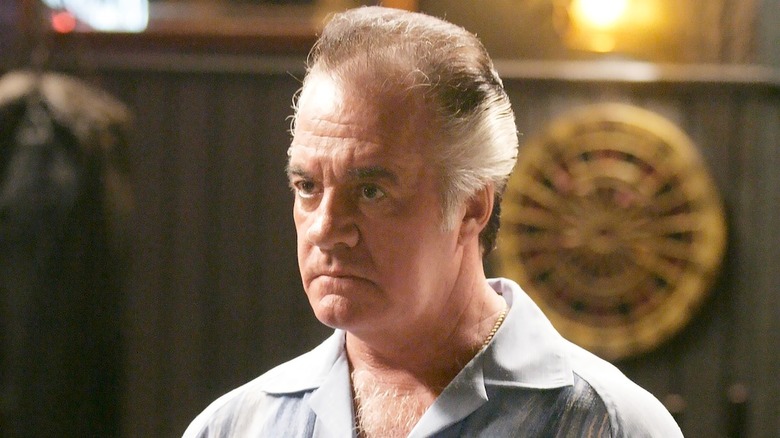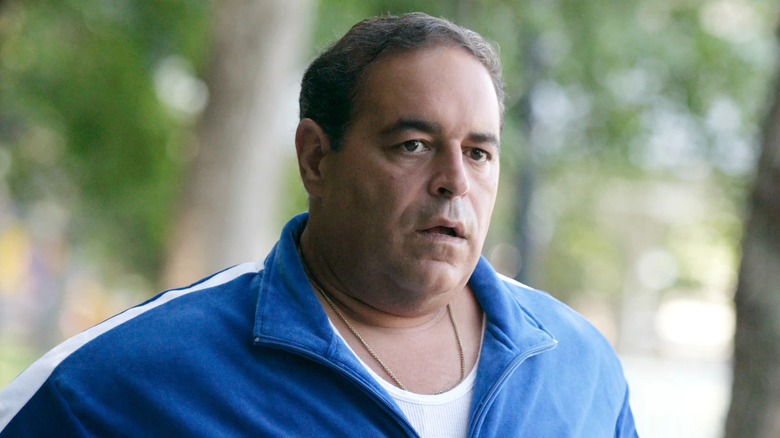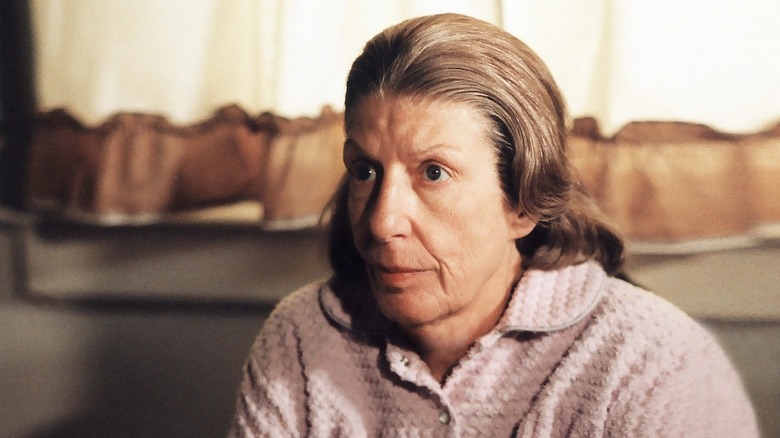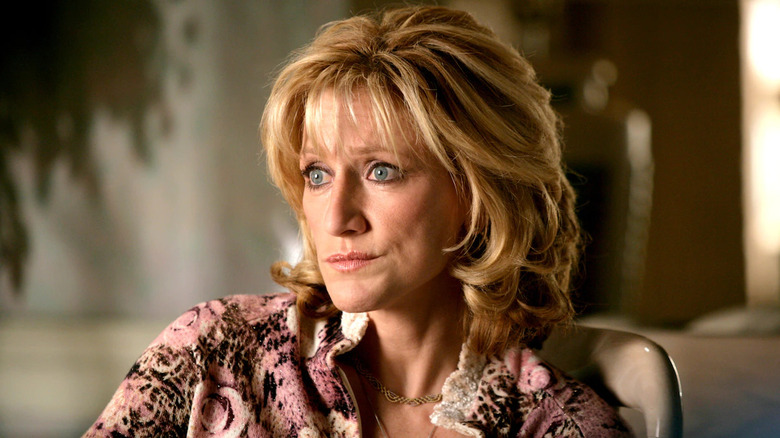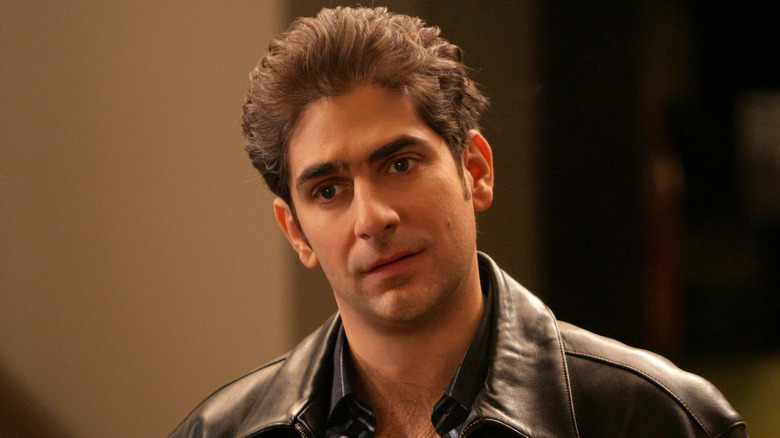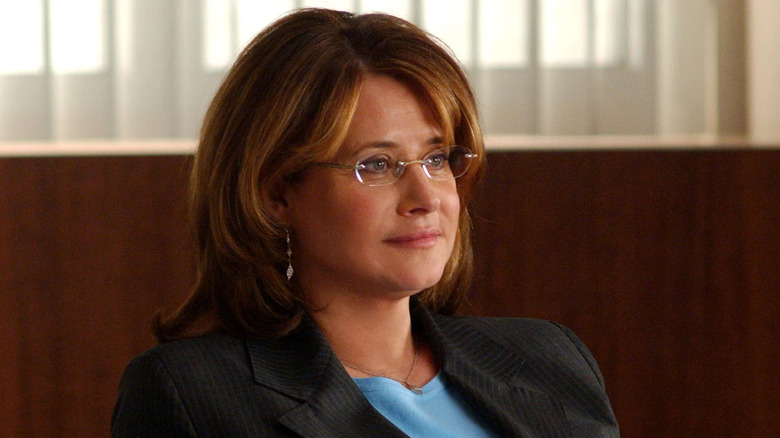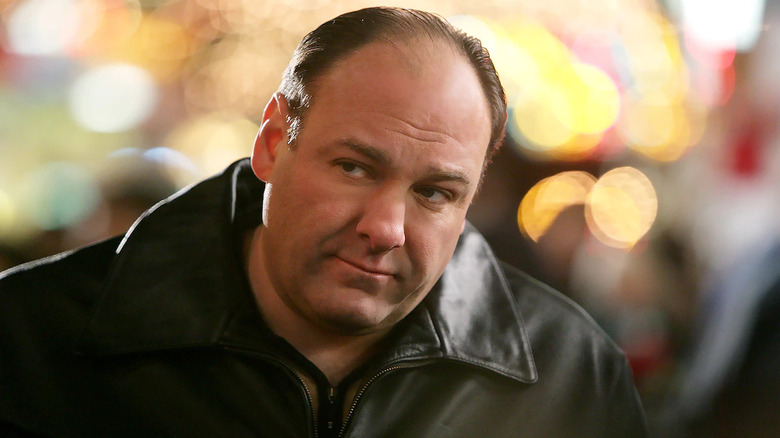The 14 Best Sopranos Characters, Ranked
When it comes to a show as expertly crafted and packed full of compelling characters as HBO's "The Sopranos," narrowing down a list of the best characters is a Herculean effort. There are just so many candidates, each with unique reflections of the show's themes of family dynamics, moral ambiguity, and the changing climate of post-9/11 America. Since the airing of its final episode in 2006, HBO's mob family drama has stood the test of time as a mark of quality yet to be matched or (surpassed) by any prestige television series.
Thanks to a legendarily talented team of writers and directors, led by show creator David Chase, who also wrote the recent prequel feature film, "The Many Saints of Newark," it's not so difficult to break down exactly why these 14 characters continue to entertain and emotionally shatter us on every re-watch of "The Sopranos." We've tried to weigh these choices by how compelling their storylines are, how nuanced and insightfully they are rendered, and how they continue to speak to us long after that infamous cut to black.
Everything beyond this point carries a big spoiler warning: We can't delve into what makes these characters so fantastic without getting into some of the show's most iconic and memorable moments.
14. Gloria Trillo
In the show's third season, Tony (James Gandolfini) meets Gloria Trillo (Annabella Sciorra), a fellow patient of therapist Dr. Melfi (Lorraine Bracco). Immediately taken with her, Tony successfully pursues Gloria as the latest of his many extramarital affairs. Although she only appears in seven of the show's 86 episodes, actress Annabella Sciorra delivers one of the most impactful and emotionally turbulent performances of the series as Gloria. Intelligent, confident, and independent, Gloria is arguably the one woman Tony Soprano could have plausibly left his wife Carmela (Edie Falco) for.
Unfortunately, complications of Gloria's personality disorder (which had caused the erosion of several past relationships as we learn in dialogue between Gloria and Dr. Melfi) lead to a tragic end for the character. After Gloria's jealous side begins to rear its head, Tony cuts their relationship off entirely. Fearing that Gloria will expose their affair to his family, he even orders one of his subordinates to threaten her at gunpoint.
In the fourth season, we learn that grief-stricken Gloria has taken her own life. It's a heartbreaking revelation for both the audience and Tony, who is haunted by Gloria's death throughout the rest of the series. Sciorra's performance as Gloria scored a well-deserved nomination for outstanding guest actress in a drama series at the 2001 Primetime Emmy Awards, and remains one of "The Sopranos'" most memorable characters.
13. Artie Bucco
Alongside his wife Charmaine (Kathrine Narducci), Artie Bucco (John Ventimiglia) is best known as the co-owner and head chef of Vesuvio, an Italian restaurant popular with many of the show's characters. Charismatic and ambitious, Artie is a well-respected local figure. Underneath the charm, however, he's deeply insecure and wishes he could take part in Tony's less-than-legal enterprises.
His relationship with Tony is strained throughout the show. Most notably, Vesuvio burns down in the first season as a complication of a hit ordered by Tony's uncle Junior (Dominic Chianese). Although Tony hides his involvement in the incident and Vesuvio is rebuilt with insurance money, Artie eventually learns the truth through Tony's mother (Nancy Marchand) and never truly forgives his childhood friend.
John Ventimiglia's portrayal of Artie Bucco is equal parts charming and pitiful. In later seasons, Artie's desire to live a more extravagant life leads him into fruitless attempts at wooing younger women (including Adriana La Cerva, played by Drea de Matteo) and getting into crippling debt, which nearly leads to his death. He's a character you want to see succeed because he's good at heart, but his frequent self-sabotage is more cringe-worthy than anything else.
12. Furio Giunta
In the show's second season, the DiMeo crime family grows its ranks with the introduction of Furio Giunta (Federico Castelluccio). As part of a deal scored by Tony on a visit to Naples, Furio is brought back to the United States and quickly becomes an indispensable member of the crew.
At first, the wonders of America are exciting and novel to Furio. His unflinching brutality on the job and loyalty to Tony bring him close to the family, and he soon becomes infatuated with Carmela. The feeling is mutual, and an unspoken romance blooms between Tony's wife and his right-hand man.
The longer Furio spends in the Italian-American world, the more he becomes disillusioned with his decadent new home and his employer. Tony's blatant disrespect for Carmela becomes a thorn in Furio's side, leading to a nail-biting sequence where Furio very nearly kills Tony by pushing him into the rear propeller of a helicopter during a drunken night out. We never learn of Furio's fate, as he flees the country after Carmela admits her affection for him to Tony.
We'd be lying if we said the idea of Furio and Carmela eloping to Naples wasn't an appealing one — but it wasn't meant to be. On the bright side, we get a loveable character who reflects the cavernous divide between the Italian and American Mafias.
11. Anthony 'A.J.' Soprano
One of the greatest parts of watching "The Sopranos" from beginning to end is watching the Soprano children (and the actors that played them) grow up from season to season. While Meadow (Jamie-Lynn Sigle) and A.J. (Robert Iler) are both great characters, Carmela and Tony's son ultimately takes this spot on our list.
From the early days of Mario Kart and bowl cuts to nightclubs and facial hair, Robert Iler does a fantastic job of capturing the troubled upbringing of A.J. Soprano. It's clear from the start that A.J. is cut from a different cloth from that of his father. He has little to no interest in becoming the heir to the mob family legacy and lacks the sociopathic edge required to survive in the business.
A.J. is sensitive and frequently struggles to meet his parents' expectations of him, not only at school but as a human being. Torn between old and new ideas of success and struggling to find a sense of identity amidst rapidly changing cultural, social, and political worlds, he's an excellent example of the post-9/11 American youth.
10. Janice Soprano
On the surface, wayward hippie Janice Soprano is the antithesis of her younger brother Tony, but truthfully, the reason they clash so much is that they're more similar than either would care to admit.
Played by Aida Turturro in the series and Alexandra Intrator in the prequel film, "The Many Saints of Newark," Janice is a frequent issue for Tony. After many years of soul-searching, the eldest Soprano sibling returns to Newark to care for her elderly mother in the show's second season.
She becomes romantically involved with several members of the DiMeo crime family, including Richie Aprile (Chase Vacnin), Ralphie Cifaretto (Joe Pantoliano), and Bobby Baccalieri (Steve Schirripa). One of Janice's finest moments is her murder of Richie Aprile after he strikes her during an argument, gaining Tony's respect and proving that she's just as much a Soprano as her brother.
Janice might be frustrating as a character, but Aida Turturro's performance is arguably one of the show's best — especially during the moments in which Tony and Janice set aside their differences and reflect on their shared experiences as the flawed Soprano children.
9. Adriana La Cerva
Drea de Matteo is spectacular as Adriana La Cerva, loving partner to Christopher Maltisanti (Michael Imperioli) and under great duress, an FBI informant in later seasons. Adriana is an almost endless source of optimism and affection, bouncing back from countless instances of Christopher taking her for granted. It's impossible not to appreciate her infectious personality from the beginning.
When she's befriended by an undercover FBI agent in the show's third season, it's gut-wrenching to see her being taken advantage of to bring down Tony's crime syndicate. Her loyalty to Christopher initially keeps her from offering the authorities anything to work with, but as they apply pressure, she slowly buckles in the naïve hope of escaping with her boyfriend.
In a devastating but inevitable act of betrayal that still brings tears after all these years, Christopher ultimately chooses the family over his fiancé. Oh, Adriana. You deserved so much better.
8. Paulie Gualtieri
Paulie Gualtieri (Tony Sirico) is one of the DiMeo crime family's oldest and most loyal members, having served under both "Johnny Boy" Soprano (Joseph Siravo) and his son Tony. He's undoubtedly one of the show's biggest sources of comic relief, but Paulie also has some of the most compelling story arcs in the later seasons.
Despite his constant wise-cracking (and iconic cackle), Paulie is ruthless in the field. He's also incredibly stubborn as best depicted in one of the show's most beloved episodes "Pine Barrens," in which he and Christopher almost freeze to death in the New Jersey wilderness after botching a hit.
As the series progresses, a much more emotional and superstitious side of Paulie is revealed. When he learns his beloved elderly mother (Frances Esemplare), may not be his real mother, Paulie is bereft and outraged, proving that there's a frightened young boy hidden deep down in many of the show's staunch Mafia men.
7. Vito Spatafore
Vito Spatafore, played by Joseph R. Gannascoli, doesn't factor into "The Sopranos" in a major way until the show's third season. When Vito is caught in a compromising situation with another man in the fifth season, the ensuing story arc makes him one of the show's most memorable characters.
Vito is an effective earner, steadily rising up the ranks of the family throughout the series, but when he's caught dancing provocatively in a gay bar in the show's sixth season, Vito knows he has no choice but to flee or face certain death as a response to his bisexuality.
The story arc involving Vito's escape to New Hampshire where he falls in love with Jim, a local diner cook, is one of the show's most compelling examples of character writing. Torn between embracing his true self and giving up his cushy mob lifestyle, Vito serves as a prime example of the Mafia's conservative ideals clashing with modern progressive reality.
6. Livia Soprano
Anyone would be forgiven for hating Livia Soprano (Nancy Marchand) — especially her son. Manipulative and cruel, Livia looms over Tony even after her passing thanks to a lifetime of put-downs and guilt.
Despite putting on the appearance of being a helpless widower, she conspires with Junior Soprano to have her son (unsuccessfully) killed in response to being moved into a retirement village. Her gradual mental decline in the second season is (guiltily) more than a little satisfying after seeing how she treats those around her. She's a superb villain, and the way she expertly gets under Tony's skin is incomparable to even the most deadly adversaries he faces in the show's run.
Livia was based on show creator David Chase's late mother, Norma, and the personal touches in conjunction with Nancy Marchand's performance are what makes her so effective. Vera Farmiga also knocked the role out of the park in the prequel film, "The Many Saints of Newark" as a much younger Livia.
5. Corrado 'Junior' Soprano
Tony's uncle Carrado, affectionately known as "Junior" to most, is without a doubt one of the show's most compelling characters.
With his father gone, Junior is one of Tony's few living connections to the old-school days of the DiMeo crime family. While their affection for each other runs deep, Junior's dwindling power becomes a point of contention for the pair in the show's first season, kicking off an ongoing feud that threatens to tear the family apart.
He might be a villain for much of the series, but Junior's relentlessly charming personality also makes him inherently likable, even when he puts Tony in a coma in the show's final season after his looming dementia causes Junior to mistake his nephew for a long-dead rival.
Junior's bond with Bobby Baccalieri (Steve Schirripa) is also adorable, even if he doesn't always treat Bobby with the respect or kindness he deserves. When Junior's mental state begins to significantly decline in the show's later seasons, the affectionate relationship between Bobby and Junior is among its most memorable.
4. Carmela Soprano
Let's be honest. Edie Falco is such a good actress, she would've made a more mediocre character sing anyway. However, Carmela Soprano is one of "The Sopranos'" many examples of a great character brought to life by a fantastic actor.
Far more than just the quiet trophy wife of a mobster, Carmela Soprano is a complicated woman. While she's right in her criticisms of Tony's violent and opulent lifestyle, she certainly doesn't mind turning a blind eye when it comes to that lifestyle's spoils — a point that frequently drives a wedge between the couple throughout the show's run.
Carmela's complicated relationship with her husband's line of work is deeply compelling, and it's hard to resist rooting for her when she's tempted to stray from their marriage when Furio appears on the scene. Despite her mistakes, she's an intelligent, highly independent woman who tries her best to keep her family together through even the most nightmarish scenarios.
3. Christopher Moltisanti
Tony's nephew Christopher (Michael Imperioli) is handsome, charismatic, and has a clear vision of the man he'd like to become. Unfortunately, he's also the king of self-sabotage.
It's hard to name the single best story arc involving Christopher Moltisanti because they're all superb. What makes Christopher such a brilliant character is his determination to make everybody proud, even if he constantly falls ten steps back for every step he takes forward.
From his attempts at breaking into Hollywood as a screenwriter to his struggles with heroin addiction to hunting down his father's killer, Michael Imperioli delivers one of the show's most nuanced performances. You can't help but root for him to conquer his demons, even if those demons are usually self-created.
Infamous scenes like Christopher's intervention and his accidental smothering of Adriana's dog while intoxicated are just a few examples of how simultaneously hilarious and dark the character can be, and Michael Imperioli takes that writing to the next level with his deadpan delivery.
2. Jennifer Melfi
If there's any character in "The Sopranos" who can be considered an audience surrogate, it's Lorraine Bracco's Dr. Jennifer Melfi.
We spend a lot of time with Dr. Melfi, and that is one of the show's blessings. Fans of "Goodfellas" will know that Lorraine Bracco doesn't need to be the lead to absolutely command a film or television series, and that's just as true here. As Tony Soprano's therapist, Melfi digs deep under the surface of Tony's complicated psyche, forcing him to confront his behavior and ways of thinking far beyond any mob boss's comfort level. Yet, Melfi is far more than just a prompt for Tony Soprano's introspection. She's a complex character in her own right, confronting some of the show's most important themes of identity and morality in the modern age.
When Melfi is violently assaulted by a stranger in the show's third season, she's faced with an incredibly difficult moral dilemma: She could enlist Tony's help and get violent justice, but she'd be condoning the very criminal behavior that she finds abhorrent in her patient. Melfi's ultimate decision is one of the show's most controversial moments, but it's a truly powerful stance from an all-time great character.
1. Tony Soprano
It feels like cheating to choose the protagonist and namesake of "The Sopranos" as its best character, but there's no way around it. Tony Soprano is not just the show's best character, he's one of the greatest characters in television history.
Driven by an incomparable performance by the late James Gandolfini, Tony constantly straddles the line between infuriating and loveable. It's not uncommon for long-running shows to run out of ideas for their lead, shifting the focus to more under-developed supporting characters or spiraling off into spin-off shows, but thanks to David Chase's insightful and multifaceted explorations of the modern man and the post-9/11 Mafia boss, "The Sopranos" effortlessly carries its audience through all of Tony's trials and tribulations.
It's not easy to pull off an antihero in the way "The Sopranos" does with Tony. There's no denying he's a monster who commits countless acts of violence against his enemies and even his loved ones. By so intelligently exploring and confronting the complex mechanisms of how people like Tony Soprano come to be and continue to succeed in our world, we are rewarded with a legendary television series that continues to inspire and entertain long after its final moments.

